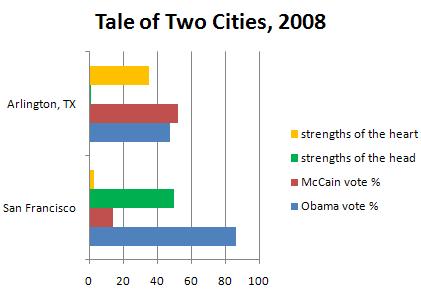Nansook Park and Christopher Peterson ask people to rank themselves on a battery of strengths that are “intellectual and self-oriented” (such as curiosity, judgment, and appreciation of beauty) and a set of “strengths that are emotional and interpersonal” (such as love, prudence, bravery, and hope). They find substantial differences in the average scores on these scales among U.S. cities. They also find that city-level differences matter for several important outcomes.
An example is the 2008 presidential election. Cities that ranked themselves high on “strengths of the head” chose Barack Obama. Cities that prided themselves on “strengths of the heart” preferred John McCain. I illustrate that pattern with two examples, San Francisco and Arlington, TX. I give San Francisco a score of 50 for strengths of the head because it was top ranked in that category among the nation’s 50 largest cities. I give it a 3 for strengths of the heart because, in that category, it surpassed only Seattle and our own warm and friendly city of Boston. Arlington was virtually the mirror image. (Vote counts from here.)
Some caveats would be appropriate. These are self-reported scores, so they may measure the perceived value of the various strengths, rather than their real prevalence in each city. The sample is not random, although the authors argue that it is representative. The relationship between the two virtues and voting outcomes might not be causal; it could be explained by some third factor. (It is not, however, the case that a particular virtue–such as faith–is mainly responsible for the results; the authors check for that.)
Caveats aside, these results seem plausible. America has hard-driving, competitive, creative, and cerebral cities that like Democrats, and warm, friendly, emotional, and devout cities that prefer Republicans. People move to San Francisco, Seattle, and Boston if they think they can succeed in research, consulting, or the arts, and they surround themselves with neighbors who would gag before voting Republican. People move to El Paso, Mesa, and Fresno because they want friendly neighbors and church picnics. They don’t necessarily vote Republican (cities in general tilt leftward), but they are far more conservative than their peers in the cerebral cities.
The Republican Party is supposed to be committed to competition and individualism; the Democrats, to solidarity and care. Yet the very cities that are most competitive and individualistic are most enthusiastic about Democrats. Maybe a caring government seems more valuable in San Francisco and Boston than in Arlington, TX.
